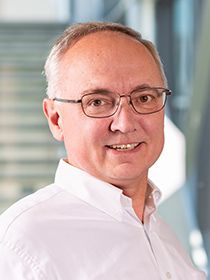The biennial international conference series on energy efficiency in historic buildings is making a stop in Krems and Singapore. At the same time and taking advantage of the time difference, personalities with the highest level of expertise from Europe and Asia will present the current state of research on the energy efficiency of existing historic buildings from 7th to 8th October and discuss solutions by exchanging European and Asian perspectives. The Research Lab Sustainable Cultural Heritage of the University for Continuing Education Krems is organizing the European part of the EEHB2024 conference, while ICOMOS Singapore is organizing the Asian part.
Professor Dr Christian Hanus, Scientific Director of the Research Lab Sustainable Cultural Heritage, formulates the central questions of the conference: "How can the historic building stock be renovated in such a way that the buildings can be operated with low emissions and in a resource-saving manner and at the same time meet the conservation requirements? How can such buildings also fulfil the requirements of their intended use? What adaptations are required as a result of the expected consequences of climate change?"
According to studies, the building sector is directly and indirectly responsible for around 40 per cent of global CO2eq emissions. In Europe and beyond, historic buildings are also coming under increasing pressure to be optimized in terms of energy efficiency. The concepts often prove to be inadequate in terms of the physical behavior of historic buildings and their conservation requirements. In addition, many discrepancies between calculation models and actual energy consumption are not always fully clarified, especially in the case of massive old buildings. Gaps between theory and practice therefore need to be closed. The same applies to the development of refurbishment methods, which must prove their suitability in terms of quality, material compatibility, durability and compatibility with historical constructions. The 5th International Conference on Energy Efficiency in Historic Buildings is dedicated to these and other questions and the associated need for research.
Participation of high-ranking institutions
In addition to the University for Continuing Education Krems, other renowned institutions from Europe are taking part in the EEHB2024 conference in Krems, including: Uppsala and Lund Universities, Sweden; University College Dublin, Ireland; UCL Bartlett School of Environment (BSEER), Institute for Sustainable Heritage, London, England; Flanders Heritage Agency; Universities of Ghent, Leuven, Liège, Belgium; Hanze University of Applied Sciences, Groningen, Netherlands; Buildwise (formerly Belgian Building Research Institute), Belgium; Fraunhofer IBP Institute for Building Physics, Germany; Cerema Institute, France; the Universities of Genoa, Milan, Ferrara and Rome, Italy; EURAC Research - Institute for Renewable Energy, Italy, South Tyrol and the University of Patras, Greece.
Time difference enables a continuous conference
The time difference of six hours between Singapore and Krems allows for an almost continuous program. The conference will open in Singapore. The afternoons in Singapore and mornings in Krems will be dedicated to joint presentations, which will be broadcast online. Further sessions in Krems will conclude the conference days.
Day one of the conference on 7th October is dedicated to theoretical principles and regulations in international comparison. The following day of the conference will be dedicated to concrete project applications and the discussion of applied research. An optional workshop on Wednesday, 9th October will round off the conference.
5th International Conference on Energy Efficiency in Historic Buildings
Date: 7th-8th October 2024
Start: 9:00 a.m. CEST, Krems (transmission Singapore from 3:00 a.m. CEST)
Venues: University for Continuing Education Krems; Congress Centre National Gallery Singapore
In addition to personal participation on site, conference participation also entitles you to attend all presentations on both continents via Zoom. Numerous presentations will also be available to registered participants after the conference (as a video or written publication).
Contact
Tags
-UWK%20Sonnleithner.jpg)
